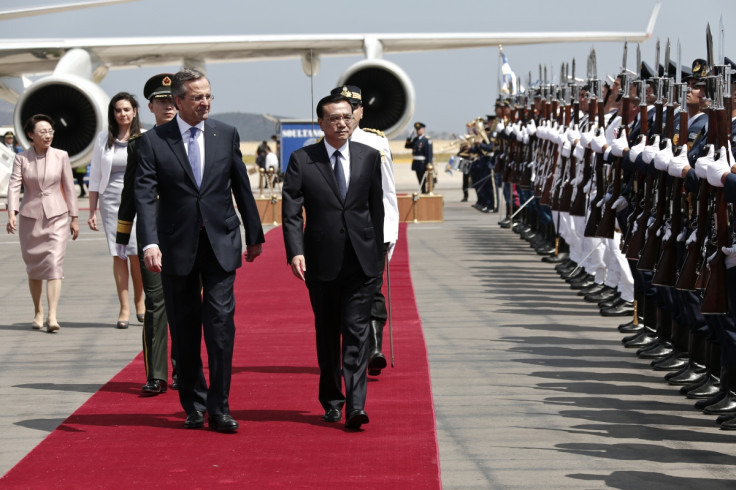Why Greece is rolling out the Red Carpet to Li Keqiang's Chinese Investment

The final stop of Li Keqiang's European roadshow takes the Chinese premier to Greece, where he will thrash out another series of trade and investment deals, the size of which would bring water to even the steeliest of eyes.
The three-day visit will put the government in Athens in the strange position of welcoming a visitor who wishes to invest billions of euros in its economy, rather than suck them out.
It's estimated in Greece that the trip could be worth almost €5bn ($6.4bn, £3.75bn) to the local economy, with a total of 19 bilateral deals ready to be signed.
Greek officials have unsurprisingly been rolling out the (naturally) red carpet. "It is my belief that this visit will produce considerable tangible results for our growing partnership," said foreign minister Evangelos Venizelos, who added that investment in Greece's ports, rail and aviation sectors are all up for grabs.
The aim for both sides is to turn Greece into a strategic logistical hub, the jewel in the crown of which would be Piraeus Port, already described as "the Gateway to Europe".
Chinese state-owned investment company Cosco is expected to beat other bidders to a 67% stake in the port, which is Greece's largest. Cosco already operates two container terminals at Piraeus and pumped €230m into its development last year.
From the outside, though, it's hard to know what the Greek public would make of this.
Polarised Society
After all, when China first emerged as a potential investor in Greece around 2009, Greek protesters took to the streets. The Prime Minister Georgios Papandreou had run on a socialist ticket that was (somewhat ironically) opposed to Chinese investment. Yet when elected, Papandreou's government did all it could to encourage it.
Fast forward five years: this is a country which returned Syriza to the European Parliament as majority party in May. The party ran on a far-left ticket, opposing the EU, capitalism and globalisation.
Analysts, though, think voters aren't anti-trade and investment, but that their real gripe is with the west – they're fed up of being dictated to from Brussels and Washington DC.
"People who are anti-EU or who expressed these complaints, they aren't opposed to foreign investment or trade per se. It's a discontent with how things turned out in terms of austerity. They don't want to turn away money, investment or tourism," Dr Roman Gerodimos, a professor at Bournemouth University and expert on Greek politics, tells IBTimes UK.
In fact, many Syriza candidates proposed strengthened relations with China and Russia as a means of filling the potential void left by EU capital, should a "Grexit" come to pass. The attitude among this section of the electorate could be neatly described as "anything-but-Europe".
And so, speaking to Greece watchers, the feeling is that Chinese investment would not be as controversial as it was in 2009. The sitting government, led by Antonis Samaras, was elected following a campaign promising jobs and growth. The government pledged to make Greece more extrovert and to court investment from outside European boundaries.
This time around, voters arguably knew what they were letting themselves in for.
"My hunch is that the Greek public would be more receptive now than in the past to economic investment. If that investment offered employment opportunities to a quite desperate population, the opposition wouldn't be as vocal as it was in the past," says Dr Dimitris Tsarouhas, the acting chair of international relations in Bilkent University, Ankara.
What's in it for the Greeks?
Other than the shed-loads of money for infrastructure projects and the creation of jobs, Greece hopes that cosying up to China will help boost exports and give it a head start on those European economies which have been slower to extend a welcome.
China's exports to Greece are growing by more than €2.2bn annually, with many Chinese visitors coming to the country in recent years. When the much-maligned Papandreou visited China a few years back, he gave Beijing the hard sell over olive oil and other indigenously Greek goods.
"He tried to utilise this example as one in which Greece opens its export capacity and becomes more competitive in areas which due to natural resources it should be more competitive in but, for a whole lot of reasons, it wasn't," recalls Tsarouhas.
It's likely that Samaras will make a similar push to get Greek produce in front of a Chinese consumer market with a growing appetite for European cuisine.
Chinese tourists have been flocking to its sandy Mediterranean coastline, with the number of visitors to Greece growing by 202% since 2008. China sees Greece as an ideal route to the Balkan and wider-European markets.
"Greece could become a regional leader in bringing China to Europe," says Gerodimos. "The Chinese government was very keen from the beginning to get an interest in the port because of its geography. Greece is a huge transport and tourism hub. It's not just about commercial goods, it's also about tourism. It's a major strategic outlet in a crucial location that brings together Europe, the Middle East and Asia."
So while they aren't dancing at the streets of Athens and Thessaloniki at Li Keqiang's tour of Greece, the chances are he'll be made to feel infinitely more welcome than some of the European peers that preceded him.
© Copyright IBTimes 2025. All rights reserved.






















